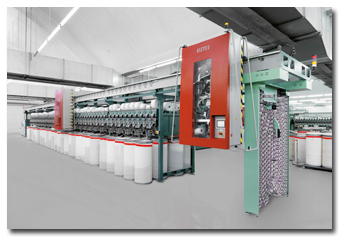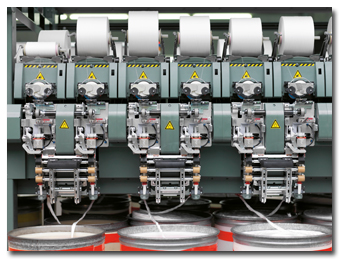ARLINGTON, Va. — September 8, 2011 — Ahead of President Barack Obama’s major speech on his plan to
reverse our nation’s high unemployment rate and rebuild our struggling economy, the American
Apparel & Footwear Association (AAFA) today submitted a strategy for White House consideration
that will create and sustain well-paying jobs for hardworking Americans within the U.S. apparel and
footwear industry. This strategy includes reforming the government procurement process, opening
markets to meet ever-changing business challenges, reducing regulatory burdens that hinder
innovation, and acting on other measures that will drive American competitiveness in an
increasingly complicated global environment.
“The U.S. apparel and footwear industry is a driver of jobs,” said AAFA President and CEO
Kevin M. Burke. “All around the country, our industry offers some of the world’s most diverse and
well-paying employment opportunities. While we’re always looking to grow that employment base,
sometimes we need Washington to develop timely new policies to keep us competitive worldwide.”
“We have identified four simple themes that, if quickly acted upon, will generate jobs here
at home within our industry,” Burke said. “By improving the way the Department of Defense procures
military uniforms and footwear, opening global markets, eliminating burdensome regulations, and
smartly reforming the tax code, the U.S. apparel and footwear industry will be able to support our
more than one million current U.S. jobs, as well as find opportunities to grow that number.”
Like many industries, the U.S. apparel and footwear industry faces unprecedented challenges
as a result of the weakened economy. During a downturn, consumers tend to cut back on the purchase
of new clothing and footwear. While the industry continues to weather this economic storm, AAFA has
highlighted a number of legal, regulatory, and other governmental challenges that if resolved,
would empower this industry to offer better goods for lower prices, expand the industry’s customer
base and create jobs here in the United States.
Department of Defense Procurement Reform
Each year, the U.S. military spends more than $2 billion on uniforms, camouflage, gear, and
combat footwear for U.S. servicemen and women. Under the Berry Amendment, which requires that all
combat apparel and footwear worn by troops be completely produced within the United States, the
U.S. apparel and footwear manufacturing base has the privilege of outfitting American servicemen
and women. In recent years, however, domestic manufacturers have lost significant market share
because of unfair preferences to federally-incarcerated inmates through a government-run
corporation known as Federal Prison Industries. As it pertains to the procurement of DOD Clothing
& Textiles, FPI’s preference needs to be limited so as to provide more jobs and opportunities
for the U.S. domestic manufacturing base.
Restart the Trade Agenda
Our strategy calls for reductions in barriers to two-way trade and broad openings of global
markets in a way that recognizes and embraces our 21st century business model. In order for our
industry to grow, we must be able to reach customers that live outside our borders. While the
United States accounts for one-quarter of the world’s apparel and footwear sales at retail, we
represent just five percent of the world’s population. Getting unfettered access to 95 percent of
the world is critical to our continued success. This includes finally passing pending free trade
agreements with Colombia, Panama, and South Korea, along with the successful conclusion to the
Trans-Pacific Partnership negotiations and swift action on the
Affordable Footwear Act (H.R.2697/S. 1069), the
Save Our Industries Act (H.R. 2387/S. 1244) and the
U.S. Optimal Use of Trade to Develop Outerwear and Outdoor Recreation Act (US OUTDOOR Act,
H.R. 2071/S. 704).
Consumer Product Safety Reform
AAFA’s job creation strategy also includes the elimination of burdensome or unnecessary
regulations that strangle productivity, prohibit efficiency, and unfairly penalize some sectors of
our industry. With the passage of the
Consumer Safety Product Safety Improvement Act of 2007 (CPSIA), the product safety profile
of our industry has been raised. At the same time, regulations under the CPSIA have caused
considerable economic damage, especially to small businesses, as companies have had to understand
and implement costly and redundant regulations. Moreover, a number of these regulations and
requirements have done little to improve the safety of products being offered in the marketplace.
Ensure Smart Tax Reform
Keeping Americans employed by competitive U.S. apparel and footwear companies
requires that any tax reforms be mounted in a careful and smart manner. Calls to close specific
“tax loopholes” may sound appealing but if not done as part of a comprehensive review of taxes, it
can lead to unintended consequences, including the laying off of workers.
Industry Job Outlook
Jobs in the U.S. apparel and footwear industry are well-paying jobs. In a survey conducted
earlier this year by AAFA and industry staffing agency 24 Seven, Inc., the median salary for the
U.S. apparel and footwear industry – from designers to sales floor representatives and everyone in
between – was found to be about $70,000 per year. Even in the face of the recession, this salary
figure is up 7.7 percent since 2009. In addition, the education level of the industry continues to
climb, job satisfaction remains steady, and the employment outlook is optimistic.
“Now is the time to harness the optimistic employment outlook for our industry and seek ways
to grow our employment numbers,” said Burke. “Whether it is a manufacturing job or a supply chain
job, every job is important, and we need to be working toward that end.”
To read AAFA’s September 7, 2011 strategy for job creation within the U.S. apparel and
footwear industry, please visit the AAFA Web site,
www.apparelandfootwear.org.
Posted on September 13, 2011
Source: AAFA






